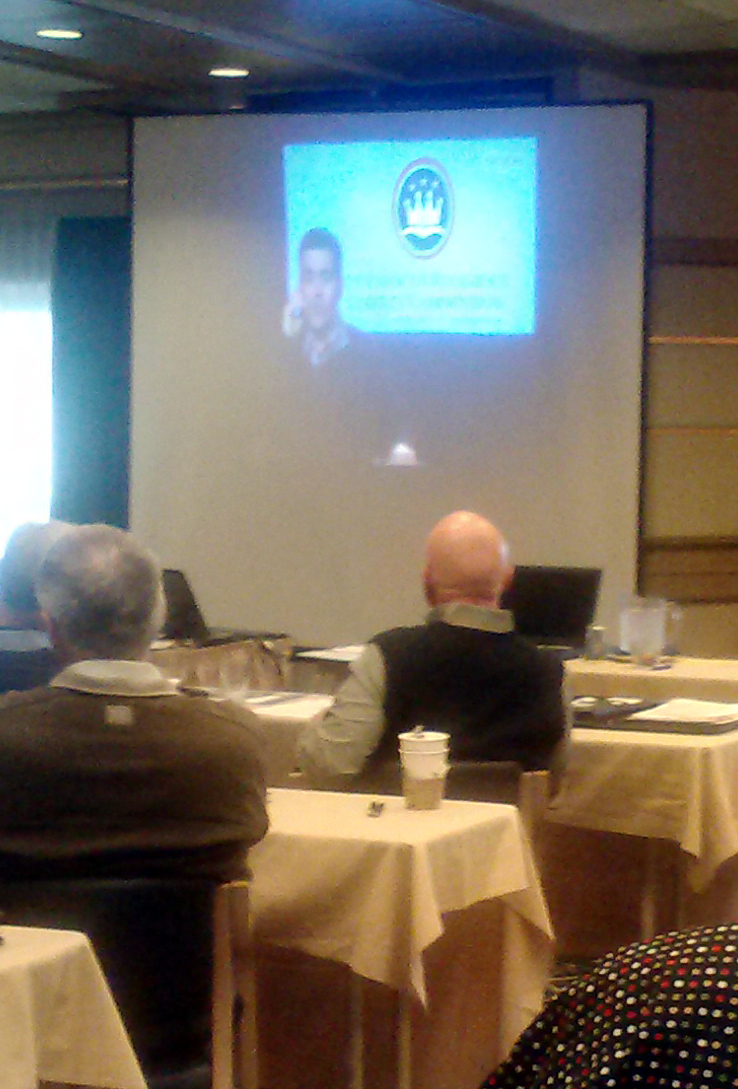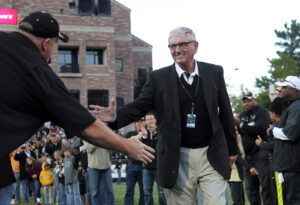
NASHVILLE (BP) — Same-sex marriage’s dominance is growing rapidly even in surprising places, so much so that churches that refuse to endorse such unions soon will be considered bigoted, Russell D. Moore has told Baptist state leaders.
Moore, president of the Ethics & Religious Liberty Commission (ERLC), addressed gay marriage and other cultural issues in a Feb. 12 question-and-answer session with Baptist state executive directors and editors. The joint session took place during the annual meetings of the Fellowship of State Executive Directors and the Association of State Baptist Publications in Coeur d’Alene, Idaho. Moore, who answered questions via Skype, was scheduled to be at the meeting but was unable to attend because weather problems resulted in cancellation of his flight.
Same-sex marriage commanded much of the attention during the session.
“I told somebody the other day, ‘I expected the same-sex marriage issue to dominate in 2014. I didn’t really expect it to be happening in Utah, Oklahoma and Kentucky,'” Moore said of states where judges recently have ruled against laws limiting marriage to a man and a woman.
“[T]his is moving very, very fast, and it’s moving in some unexpected places. But we really shouldn’t be surprised by this.”
The U.S. Supreme Court’s June decision in Windsor v. U.S. “set the groundwork” for gay marriage’s advance in the states, he said. That ruling invalidated a section of the Defense of Marriage Act that defined marriage as only between a man and a woman, thereby enabling same-sex couples to access federal benefits previously limited to heterosexual, married couples.
The “sort of language” used in Windsor has established the basis “for the legalization of same-sex marriage in all 50 states,” Moore told the Baptist leaders. “So I think we need to be ready … for that to happen.
“I think we need to be equipping our people to say, ‘What is ministry going to look like in a [post-legalization of] same-sex marriage America?’ And that’s not just in those blue states — Oregon and Massachusetts and New York — but Mississippi and Alabama and Georgia.”
He said, “[F]rankly, any congregation that is not actively blessing same-sex unions over the next five to 10 years is going to seem bigoted in the eyes of the world. That is going to be the case.”
Regarding same-sex marriage and other sexuality issues, Moore included the following points:
— The immediate threat to religious freedom regarding such issues is not to churches but to institutions and individual consciences. Regarding churches, Moore said, “I don’t think it’s going to happen immediately — by immediately I mean in the next 25, 30, 40 years — in terms of the government coming in and prosecuting people for speaking” against homosexuality. Instead, he said, the near threat is to institutions, such as adoption agencies and children’s homes, and individual consciences, such as those of florists who refuse to provide their services for same-sex weddings.
— Churches need to address the gamut of sexual immorality. “What we need to say to our people and to the outside world is the standards of sexuality that we have are not ours to change,” Moore said. “These are not things that we can vote on like our bylaws. These are things that have been given to us by Jesus…. I think when we’re very clear about that and we teach that while at the same time being on mission so that we’re loving people, we’re listening to people and giving that clear word of reconciliation of what it means to come to Christ and to know Christ, I think that’s what’s going to bear fruit in the long run.”
— “[W]hat we have to do is to spend more time talking about why marriage isn’t just a social issue; it’s not a political issue; it’s a gospel issue.” He said, “[T]he sexual union in marriage is picturing a gospel presentation…. [W]e’ve got to explain biblically speaking what marriage is and this is why it differs from what you’ve seen around you from the divorce culture and now from the sexual revolution culture. It’s a very different thing.”
— “[I]t’s also important that we don’t try to provide simple answers to the origins of homosexuality in a way that can sometimes lead to the condemning or shaming of Christian parents.” Parents in churches fear asking for prayer for their children who are homosexuals because they think people will question what they did wrong in their homes, he said. “Instead, we need to be able to equip those families to love children who are sometimes far from the Lord and to be able to provide that bridge [on] which they can come back.”
Assessment after eight months at ERLC
Moore told the state executive directors and editors he recommends a two-fold perspective for Southern Baptists and other evangelical Christians after serving as ERLC president since June 1.
“I think we need to have a sobriety in understanding what is happening around us, while at the same time understanding and seeing a sense of hopefulness in the triumph of Christ. God’s people are moving. God’s Gospel is moving forward,” he said.
“And we need to recognize that one of the things that we’re going to see happening is that we’re going to face some challenges that we didn’t face before. Some of those are going to be cultural. Some of those are going to be technological.”
He said, “Behind all that is a cultural change, a culture that is starting to see Christianity as something that is stranger and stranger to it. And we just need to be faithful in equipping and raising up a new generation of people who understand, ‘Yeah, Christianity is counter-cultural. Christianity is something that’s going to be bucking against the spirit of the age regardless of what age it is.’
“And we need to be cultivating the kind of people who are able to live with that kind of stigma, sometimes that kind of cultural marginalization but who are able to do it with the proclamation of the Gospel.”
Optimistic about Hobby Lobby decision
While he is not hopeful the Supreme Court will uphold the biblical, traditional definition of marriage, Moore said he is optimistic the justices will defend religious freedom against the Obama administration’s abortion/contraception mandate.
The high court will hear oral arguments March 25 in cases involving challenges by Hobby Lobby and Conestoga Wood Specialties to the mandate, which requires employers to provide contraceptives, including abortion-causing drugs, for their workers. The family owned businesses have conscientious objections to paying for drugs and devices that can cause abortions.
Moore is “very optimistic,” he said, because of the 1993 Religious Freedom Restoration Act, which requires the government to have a compelling interest to restrict religious liberty. He also is hopeful because past Supreme Court opinions reflect “a commitment to religious liberty among some [justices] who wouldn’t be with us on some other issues,” he said. “If I had to predict it right now, I think we’ll not only win the Hobby Lobby case, but I think there are going to be a couple of votes on the Supreme Court that are going to shock some people.”
Encouraged and discouraged regarding Roe v. Wade
He is both “cautiously optimistic and somewhat pessimistic” regarding the future of Roe v. Wade, the 1973 Supreme Court decision that struck down all state abortion restrictions, Moore said.
Describing Roe as “a train wreck of a ruling,” he said, “I think the longer we get away from it, the more apparent that is going to be.
“I’m also optimistic because of the fact that we have such a vibrant pro-life movement in this country and because that pro-life movement is actually persuasive…. [P]eople are actually being persuaded, and they’re being persuaded on the basis of seeing things. They’re being confronted with the fact that this is a person. Technology is actually in our benefit.”
He also said, “What makes me pessimistic are a couple of things. One is there is a really committed abortion activist lobby in this country…. [A]nd they are very well organized and are [pushing ahead] because they see it as being all or nothing on this.”
The other reason for concern regards the changing technology represented by abortions induced by drugs outside clinics, Moore said.
“Right now, we’re concentrating, rightly so, on the issue of clinics,” he said.
“The problem is though that the technology is moving away from the clinical and more toward the chemical, which gives an even more accepted sense of anonymity…. So I think we need to be watching how the abortion movement becomes more chemicalized, which means it’s going” to be more dangerous, he said.
He has noticed an interesting, recent trend in his interactions with reporters on the abortion issue, Moore told the audience.
“When I’m having conversations with secular, non-Christian media people and the cameras are off and we’re just kind of talking [afterward],” he said, “I can’t tell you how many times a media person will say, ‘I totally disagree with you on [homosexuality], but you’ve got a point on abortion. I can see where you’re coming from on the life issue.’
“I don’t think that would have been the case 10 years ago,” Moore said.
Immigration reform in next 18 months
The country is moving toward agreement on the volatile issue of immigration reform, and he expects a solution in the next 18 months, Moore said.
“I really think the country is moving to a place where we’re coming to more agreement rather than more disagreement on this issue to say, ‘Let’s fix the border, and then let’s try to find a way and a means for the people who are law-abiding, hard-working people … who are trying to find a way to make that right [to have an earned path to citizenship],'” he said.
“And I think we’re probably going to get there in this country over the next year, year and a half. It’s a slow process, but frankly I think slowness sometimes is good in order to work through all the kinks and all the problems we might have in the process. But I think we’re going to move to some solution there.”
Something he is excited to see among Southern Baptists and others “is the way that we have such a large number of first- and second- and third-generation Americans, some of them immigrants, some of them who are already citizens who are part of our churches and who are really changing church life,” Moore said.
The first question asked of him recently by a reporter for a Spanish language media outlet, he said, was: “‘Why are Southern Baptists so kind and so other-directed?’ And it kind of took me back because I don’t know that I’ve ever been asked that in an interview before.”
–30–
Tom Strode is Baptist Press’ Washington bureau chief. Get Baptist Press headlines and breaking news on Twitter (@BaptistPress), Facebook (Facebook.com/BaptistPress) and in your email (baptistpress.com/SubscribeBP.asp).













